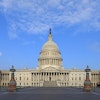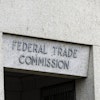Americans Deserve a Transparent and Accountable FTC
The Federal Trade Commission’s (FTC) recent actions are alarming and pose a serious threat to our economy.

American companies are already facing historic challenges with inflation, strained supply chains and worker shortages, and the FTC's actions are only accelerating uncertainty and threatening our economy.
Under Chairwoman Lina Khan, the FTC has radically departed from its core mission to protect consumers and competition.
Rather, the FTC is overstepping its regulatory authority, undermining our system of checks and balances, ignoring due process, and bypassing longstanding regulatory norms to expansively regulate industries and manage our economy with a government knows best approach.
Areas of Overreach
- RulemakingUnder Lina Khan the FTC has embarked on a rulemaking bonanza often skirting or outright ignoring whether or not it has Congressional authorization.Learn More
- LitigationThe FTC’s litigious approach to enforcement is denying companies basic rights to due process.Learn More
- Merger ActivityBy improperly using a rulemaking process, the FTC is poised rewrite antitrust law based off false economic and often partisan assumptions.Learn More
Holding the FTC accountable on Capitol Hill
On Capitol Hill
The FTC has engaged in its own unfair and deceptive practices as it lobbies Congress to pass legislation that would give the agency sweeping authority.
Holding the FTC accountable in the courts
In the courts
The FTC is bypassing longstanding norms to expansively regulate industries and manage our economy with a government-knows-best approach.

FTC: A Timeline of An Agency Gone Rogue
This timeline shows the ways in which Chairwoman Khan has moved to silence dissent at the FTC and consolidated power in ways that call into question the independence of the agency.
Learn More
Explore More
- Antitrust
A Shift in Merger Enforcement Risks Damaging Our EconomyA new study finds that under the previous approach to merger enforcement there was a strong link between mergers and innovation. A radical new approach to merger enforcement poses a severe threat to the economy.
By Sean Heather
- Antitrust
What Does the FTC Want to Ban Next?
By Sean Heather
- Antitrust
Inside the FTC’s Ploy to Quash A BioTech Merger
By Sean Heather - Employment Policy
6 Questions About the Impact of Noncompete Agreements on Businesses and Employees
By Stephanie Ferguson Melhorn
FTC Overreach
- Regulations
The Chamber of Commerce Will Fight the FTCThe U.S. Chamber of Commerce will fight in court to hold the FTC accountable to the rule of law.
- Antitrust
What the Experts Think About the FTC
By Sean Heather
Competition and the FTC
Consumer Protection and the FTC
Rulemaking and the FTC
FOIAs and the FTC
Mergers and the FTC
- Antitrust
Why FTC’s Lawsuit Against Meta Is Concerning for the Entire Business CommunityRather than economics, the FTC’s complaint against Meta seems grounded in the malleable concept of “potential future competition.” Here's why the business community should be concerned.
By Sean Heather
Latest Content
Inflation is already hurting families, workers, employers, and our economy, and the American Innovation and Choice Online Act would only lead to higher prices for consumers.
The American Innovation and Online Choice Act would give unprecedented authority to FTC and DOJ bureaucrats to micro-manage the American economy and pick winners and losers in the marketplace.
The letter outlines concerns that the FTC and DOJ Listening Forums on mergers and acquisitions were intentionally designed to cast mergers as harmful.
Alvaro Bedoya’s confirmation to the FTC gives Chair Lina Khan a 3:2 Democratic majority and potentially the tie-breaking vote she needs to push forward her radical, anti-business agenda. Here’s why that’s a problem.
The procedures manual summarizes the procedures the FTC follows to execute its responsibilities for the Commission decision making process.
This Hill letter was sent to the Members of the Senate Committee on Commerce, Science, and Transportation, opposing S. 4145, the “Consumer Protection Remedies Act of 2022."
As the Federal Trade Commission consolidates power and mulls further consumer protection enforcement and rules, American businesses should be on notice that their AI innovation and ability to attract new earners could be at risk.
Industrial concentration is a myth that underpins the administration's executive order on competition, its narrative around inflation and serves as its excuse to overregulate. America is home to the world's most vibrant and dynamic economy thanks to vigorous competition in the marketplace that drives new ideas and innovative products and services for consumers.
This whitepaper analyzes U.S. economic census data to empirically expose the faulty premise that underlies the Executive Order on Promoting Competition in the American Economy.



















